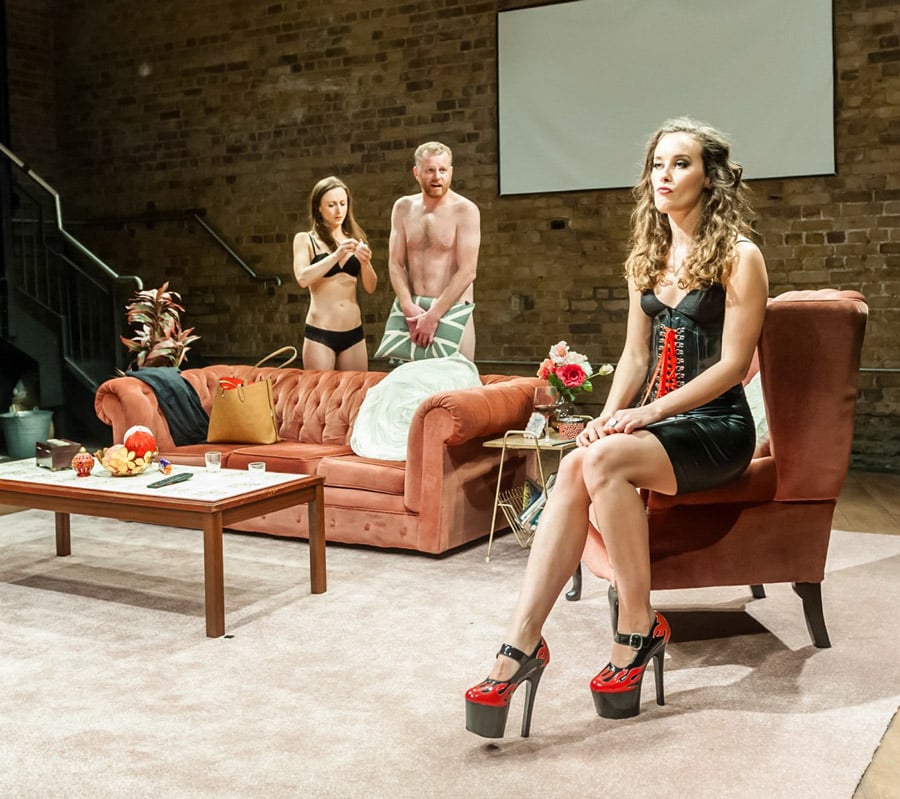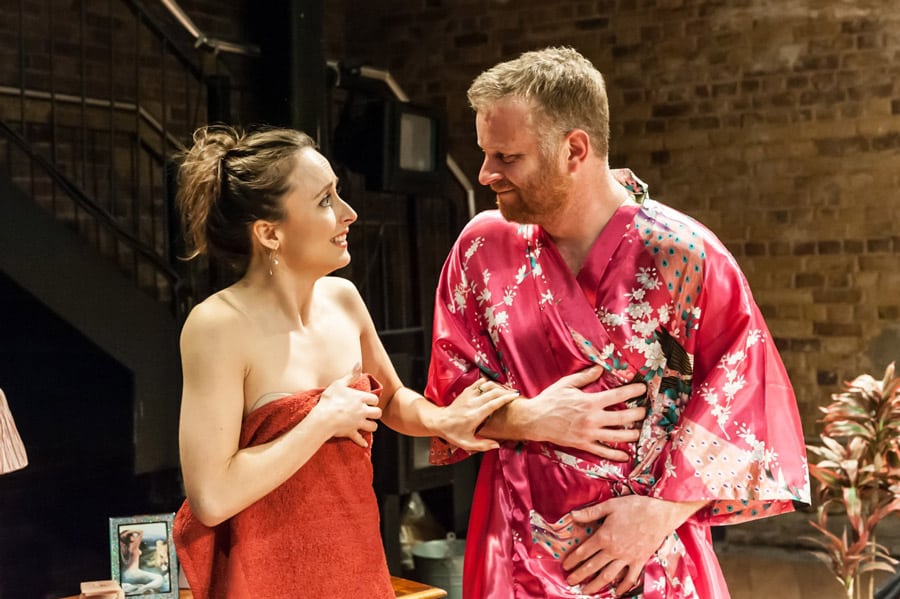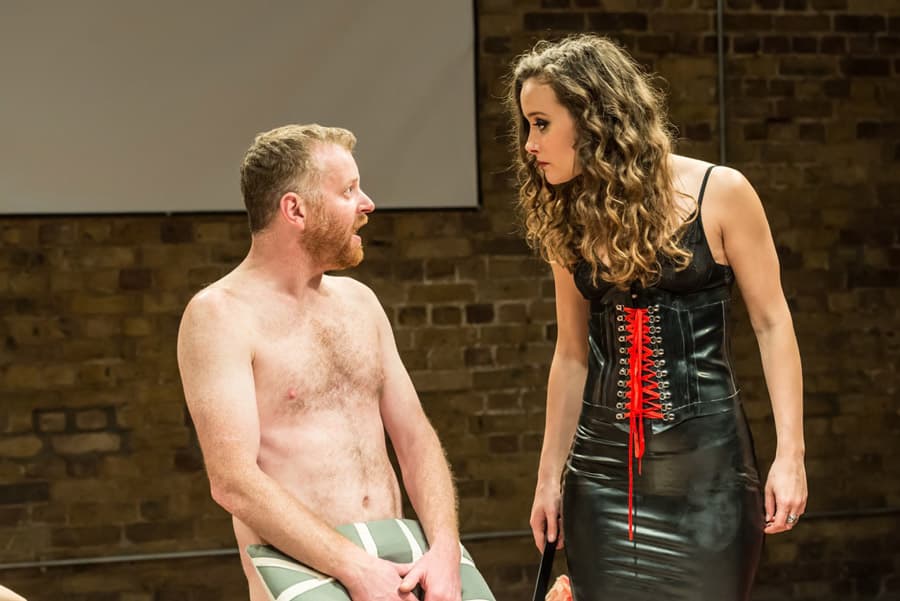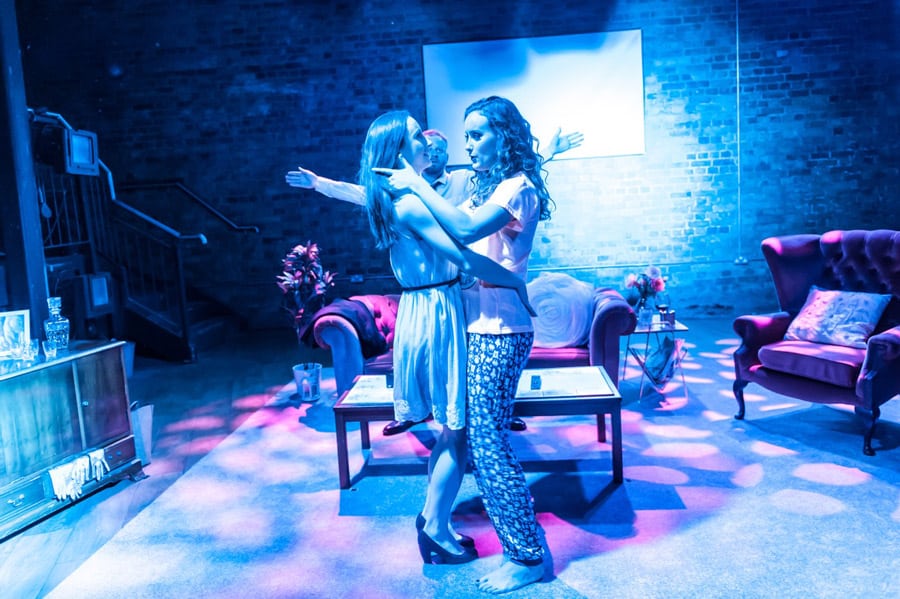
Threesome
Union Theatre,
Friday 17th March 2017
3 Stars
Book Tickets
There is definitely a market for plays that, in the words of writer-director, Jamie Patterson, ‘say the things that everyone’s thinking, but no one actually says’, and this is one play that has found that market. Last spring, having been a surprise hit on the festival circuit, this show arrived at the Union for an equally successful fortnight’s run. Now it’s back: longer, bigger, and as one might say…. more satisfying.
Yes, ladies and gentlemen, it is about sex, and it is a sex comedy, a fluffy confection telling the story of a slightly bored married couple going out – after many years’ absence – to a nightclub to pick up a girl to join them ‘in the bedroom’. Conceived (if you will) as a vehicle for his partner, April Pearson (she from ‘Skins’ on Channel 4), Patterson builds the show around her central performance as the insouciant vamp, Lucy, who – far from being an easy score for marrieds, uptight Kate (Gemma Rook) and would-be louche Sam (Chris Willoughby) – is the hostess for this charming little gathering and runs rings around the pair of them, breaking down the walls of their tepid and inhibited relationship (and selves), and transforming them in a manner that is very much for the better.
 The casting is essential to the success of this venture, and the play gives us a threesome in more ways than one. Pearson’s background is principally in TV and film, Rook is very much of the theatre with a cool, steely presence that prevents her Kate from ever seeming weak, and Willoughby’s ace is his calling – nay, vocation! – as a gifted stand-up comedian. These three different intelligences at work with each other on the stage make for fascinating viewing, and the play functions best when they are able to draw on and exploit their own personal strengths to their fullest.
The casting is essential to the success of this venture, and the play gives us a threesome in more ways than one. Pearson’s background is principally in TV and film, Rook is very much of the theatre with a cool, steely presence that prevents her Kate from ever seeming weak, and Willoughby’s ace is his calling – nay, vocation! – as a gifted stand-up comedian. These three different intelligences at work with each other on the stage make for fascinating viewing, and the play functions best when they are able to draw on and exploit their own personal strengths to their fullest.
To his credit, Patterson gives them every chance. Coming from a career in independent cinema (he has made 11 films over the past 10 years), this is his debut as a playwright, and an extremely robust and promising one it is, too. He begins on home turf, by showing the ‘pick up’ in a film clip (editor, David Fricker, camera, Cliff Trail). This lays down the ground rules for the encounter, and also establishes the writer’s voice: the characters listen very carefully to each other, or at least Lucy does, and so we realise we have to do the same. And that’s where the laughs lie. Patterson fairly packs them into the script, an example: Kate: Guess how old I am. Lucy (who is 25): 35? Kate (crestfallen): I’m 31. Lucy (carelessly): It’s the same thing.
 After the film prologue, the lights snap up (perhaps a little too fully, too quickly – the lighting isn’t credited), on Lucy’s apartment – a handsome set by designer William Hooper – where the guests not so much ‘chill out’ as thaw. There is a great deal of very frank talk about sex and drugs – the act is mainly driven by dialogue, and a few ‘interactive games’ are played (see above): and things liven up considerably when Sam does a very funny striptease. Then, that act ends where the first version of the play stopped, as the playmates rush off for that promised visit to the bedroom. Patterson’s great advance here, however, as a writer for the theatre, is what he does with the second half. As with traditional light comedy, there are two further acts, comprising the two scenes of the second part: the first is a return to the living room after the ‘foreplay’. and we see the guests wrestling with their crumbling phobias and frustrations. It is here that the author’s confidence in using the direct physical impact of theatre really scores, especially in the hilarious tangle he fabricates in the aftermath of Sam’s experimental foray into anal passivity. (You see that Patterson means what he says, and does what he means to?) After an amusing audio-break spoofing David Attenborough’s nature programmes, the third act is the beautiful afterglow, showing us the transfigured married couple and hinting at who knows what other adventures still to come.
After the film prologue, the lights snap up (perhaps a little too fully, too quickly – the lighting isn’t credited), on Lucy’s apartment – a handsome set by designer William Hooper – where the guests not so much ‘chill out’ as thaw. There is a great deal of very frank talk about sex and drugs – the act is mainly driven by dialogue, and a few ‘interactive games’ are played (see above): and things liven up considerably when Sam does a very funny striptease. Then, that act ends where the first version of the play stopped, as the playmates rush off for that promised visit to the bedroom. Patterson’s great advance here, however, as a writer for the theatre, is what he does with the second half. As with traditional light comedy, there are two further acts, comprising the two scenes of the second part: the first is a return to the living room after the ‘foreplay’. and we see the guests wrestling with their crumbling phobias and frustrations. It is here that the author’s confidence in using the direct physical impact of theatre really scores, especially in the hilarious tangle he fabricates in the aftermath of Sam’s experimental foray into anal passivity. (You see that Patterson means what he says, and does what he means to?) After an amusing audio-break spoofing David Attenborough’s nature programmes, the third act is the beautiful afterglow, showing us the transfigured married couple and hinting at who knows what other adventures still to come.
It’s all as neat and tidy as a well-tended pudenda. Jason Rush is the loyal executive producer here, helping his colleague Patterson onwards with the realisation and development of this bold and bracing concept in a new form: it is also his first theatre production, and a near flawless one at that. As a play, it works like a breath of fresh air, breaking open the closet of what really happens today between sexually active people with a crowbar of wit and brains, as well as some compassion and tenderness. As a first play, it is wonderfully accomplished, with more than enough humour and clever observation to justify its stay of two hours (including the interval). Just as Patterson is getting better – rapidly – at making the physical properties of theatre work for him, I’m sure that he is also realising that script writing for the theatre makes special demands. Even the airiest of comedies are most effective when based on pretty solid foundations of realism: here, after an opening hint about the rental value of Lucy’s apartment, we really learn nothing at all of any material consequence about the characters, and that makes it harder to care what happens to them. And, perhaps crucially, the motor bringing them together is never anything more than the initial casual liaison: the bigger the play gets, the flimsier that basis begins to look.
 The thing is, as the play so eloquently makes clear, sex is hugely important. Having established that, just possibly, it might need to back up its message a little more strongly, maybe by putting something more significant to ride on the outcome (as it were). Patterson’s aim is to create a light comedy, and he has succeeded pretty well. Arguably, the laughs would land with even more power were they tempered by the dangerous presence of a little more human vulnerability and complication: after all, we need to not just know but also feel, tangibly, in the room, what is holding back Kate and Sam from having a fully satisfying relationship; that would help us appreciate and value the importance of Lucy’s role in helping them towards meaningful change in their lives, so maybe we also need to experience a little bit more about what’s in it for her?
The thing is, as the play so eloquently makes clear, sex is hugely important. Having established that, just possibly, it might need to back up its message a little more strongly, maybe by putting something more significant to ride on the outcome (as it were). Patterson’s aim is to create a light comedy, and he has succeeded pretty well. Arguably, the laughs would land with even more power were they tempered by the dangerous presence of a little more human vulnerability and complication: after all, we need to not just know but also feel, tangibly, in the room, what is holding back Kate and Sam from having a fully satisfying relationship; that would help us appreciate and value the importance of Lucy’s role in helping them towards meaningful change in their lives, so maybe we also need to experience a little bit more about what’s in it for her?
Who knows. Patterson will have better answers to those questions than anyone else could think up. He’s a great new arrival in the theatre and long may he thrive. So go and see what he’s got to offer. I think you’ll like it.
Until 25 March 2017
